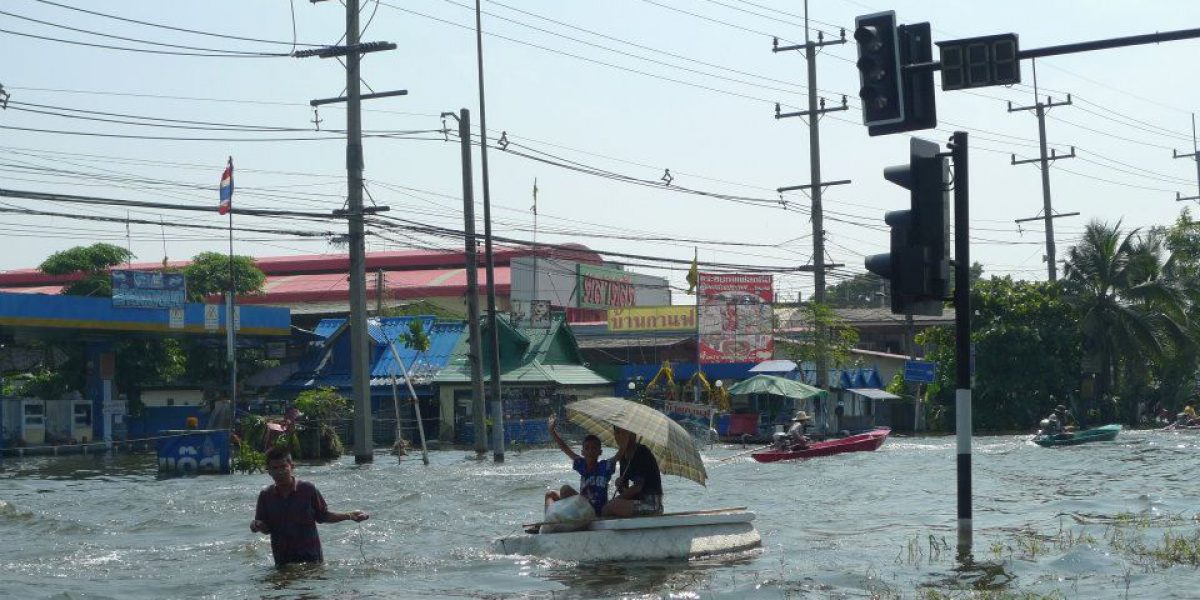Thailand: floodwaters mirror crisis and character
16 November 2011|Louie Bacomo

Bangkok, 16 November 2011 – It is said that the way you deal with crisis reveals your character. For many, the flood is an opportunity to help others. JRS have met these unsung heroes during its relief response activities in the past month. Here are some of their stories.
“The senior members in our community were the first to come and give food to us,” said a 26-year old migrant worker from Myanmar who joined 40 others in a 2-storey building in Putthamonton soi 5. Migrant communities have been helping fellow migrants like this woman who is resolved to wait for the factory to rehire her after it was flooded.
Myu Oo, a 19-year old migrant worker, jumped into the boat JRS used to deliver relief goods to unreached areas in the district. He translated our conversation in Thai and Burmese.
“I am not leaving this area as this is where I can get food and survive,” he said. He has turned his access to relief goods into an opportunity to enable relief workers like JRS better understand the impacts of floods on migrants’ lives.
A Burmese refugee has acted as community resource for JRS and local organisations in reaching out to isolated areas such as the one JRS and local partners visited on November 14-16. Hundreds are still trapped in rented apartments isolated by chest-deep waters. Many of the buildings are 4-5 kilometers away from where relief goods are dropped off. Organisations have to take more effort to go beyond this access point.
Local groups like Labor Protection Network (LPN) have gone beyond this point to seek places of greatest need. LPN and JRS have conducted rapid assessment and relief and rescue mission together during this flood. When JRS relief operation finished with a shared lunch at 5 p.m. that day, LPN workers excused themselves, “because we have to go to another rescue assignment,” said Ko, the team leader, smiling.
And the relief operation on November 16 would have ended late evening just like the assessment two days before that if not for the three boats from the Department of Marine and Coastal Resources who have been offering free rides to residents in the area. “We were working in Ayutthaya the past month and now we are assigned here three days ago,” our boat driver told us. Their group had a problem buying food because “it is hard to find food supplies in the area.” For these public servants, it is just another day.
There are dangers as well—a far more menacing than the loose crocodiles—other people who have become opportunists stepping on heads submerged in floodwaters to go higher. Boat operators have charged exorbitant fees leading others to wade in dangerous and dirty floodwaters to survive. This includes a pregnant woman who continues to go to work or risks losing her job in the factory.
The most insidious act is from an apartment owner who cut electricity in his building so he can sell drinking water to the tenants who have lost their jobs. His tenants cannot boil water anymore from the tap to drink.
The Chinese ideogram for crisis combines two characters—one representing danger and the other, opportunity. The crisis wrought by the flood in Thailand presents an opportunity to everyone. How each one of us—from communities to Cabinet, from individuals to institutions—responds to this crisis reveals who we are. It is, as it were, looking at the water and seeing what image we are making of ourselves, what character we are becoming.
Louie Bacomo, assistant regional director


